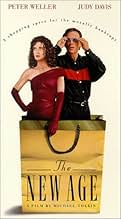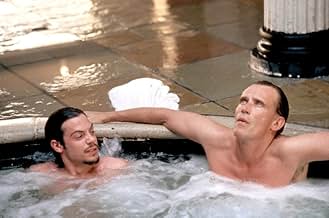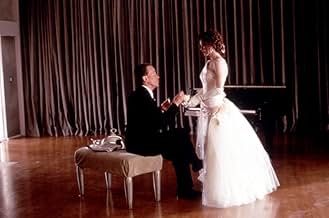NOTE IMDb
5,6/10
1,3 k
MA NOTE
Un couple branché qui ouvre une boutique à Los Angeles afin de financer un divorce à l'amiable dans une satire des temps modernes.Un couple branché qui ouvre une boutique à Los Angeles afin de financer un divorce à l'amiable dans une satire des temps modernes.Un couple branché qui ouvre une boutique à Los Angeles afin de financer un divorce à l'amiable dans une satire des temps modernes.
- Réalisation
- Scénario
- Casting principal
- Récompenses
- 1 victoire au total
Avis à la une
Wealthy LA couple Peter and Katherine live comfortably, spending on credit and having affairs. When Peter quits his job as a recession looms the couple find that money is tighter and the values they hold dear mean nothing. Can they get in touch with themselves to navigate through their journey of life.
This film seems to be an attack on the yuppie culture in LA, with their materialism, their spiritualism and their aimless, work-shy lives. It seems this way for the most part but towards the end seems to say that we can all be happy if we accept who we are and confront it. It doesn't quite ride with me but the film up till this point is good - it's interesting and a bit moving to see the couple's relationship rise and fall with the difficult times. However once it falls back on spiritualism and the like it loses a lot of credibility.
Peter Weller and Judy Davis are both good in the leads, managing to display the correct amount of arrogance and emotion during the story. Adam West has a small role and is not great - is it just me or does everyone else still see Batman when they look at him. Samuel L. Jackson has a small cameo as a motivational salesman (like Alec Baldwin in Glengarry Glenross) and he shows off his trademark powerful performance - but he's not as good as Baldwin was (the material's fault).
Overall a good attack on materialism but the spiritual stuff doesn't work.
This film seems to be an attack on the yuppie culture in LA, with their materialism, their spiritualism and their aimless, work-shy lives. It seems this way for the most part but towards the end seems to say that we can all be happy if we accept who we are and confront it. It doesn't quite ride with me but the film up till this point is good - it's interesting and a bit moving to see the couple's relationship rise and fall with the difficult times. However once it falls back on spiritualism and the like it loses a lot of credibility.
Peter Weller and Judy Davis are both good in the leads, managing to display the correct amount of arrogance and emotion during the story. Adam West has a small role and is not great - is it just me or does everyone else still see Batman when they look at him. Samuel L. Jackson has a small cameo as a motivational salesman (like Alec Baldwin in Glengarry Glenross) and he shows off his trademark powerful performance - but he's not as good as Baldwin was (the material's fault).
Overall a good attack on materialism but the spiritual stuff doesn't work.
Writer-director Michael Tolkin, whose 1991 film "The Rapture" was one of the best films of its year, let his talents go to waste with this absurd comedy of lost morals. A graphic designer and her Hollywood honcho husband are in big financial trouble: she has no clients and he just quit his job. Some of their survival solutions are quirky and interesting, but the characters are off-base right from the start. Tolkin is the new Sidney Lumet: everyone screams irrationally at everyone else, but it's tough discerning whether or not we're supposed to laugh at these banal verbal matches, often from opposite ends of the swimming pool! The leads present another problem: Judy Davis and Peter Weller are brilliant actors, yet they can't work up any semblance of chemistry together as this high-powered married couple on a tightrope. A few of their marital predicaments are worked out amusingly (they separate within the house, and date others), but their jealousies and insecurities are a bore. Tolkin (also the screenwriter of "The Player") pretends to know these people (he's pseudo-hip). It would be to his ultimate advantage if he broadened his horizons...maybe it's time he left L. A. and make some new friends? *1/2 from ****
Critics seem to have split widely on this film, and it's easy to see why. It's a rather painful, plodding thing to sit through--yet one can't get it out of the mind afterward. Writer/director Tolkin has a lot of disturbing things to say about post-industrial affluence in America in the 1990s, and in trying to say everything in one movie he has piled it on so thick that the brain requires a postmortem to reflect. Judy Davis, as she was in "Husbands and Wives," is dynamite, and the film is worth seeing just for her. The film has an uncanny eye and feel for the bleak interiors of the contemporary American service economy: the boutiques, the high-rise telemarketing boiler rooms, the house-poor interiors of career people who are hardly ever at home, etc. The film's title refers to the spiritual quest of the couple to find a meaning to their existence, or at least some alternative approach to life to their destructive materialism. How they go about it is all wrong, of course. In true hedonist fashion, they try everything. At the same time they seek a simpler, spiritual, non-materialistic life via a bunch of wacky gurus and cultists, they are indulging in carnal and other pleasures as diversions. When they open a small business, ostensibly to gain more control over their lives and income, the forces of the world are worse than any bosses. In all of this, they seem to be outside of everything they do, as in dreams when you watch yourself and are powerless to control the changing scenery. Despite their doldrums and hostility, this is a couple who have too much in common to split. During the course of all this, Tolkin gets plenty of jabs in about an American economy that seems to be teetering on wisps of hope rather than on any true productivity. By the end, the "new age" looks uncomfortably like a very old one, in which the law of the jungle reigned.
I liked this film because it does a good job of making the viewer consider what is important in life, and why. On the other hand, it is not the most exciting movie ever made. I recommend this if you want a story to ponder that exposes modern values to criticism. I give it a 7/10.
Peter and Katherine are a typical couple of California yuppies. They want to be cool, the want to indulge themselves, they live lavishly on their credit cards, and they hold "spiritual values" above wealth and work. Unfortunately, when their careers go down the toilet during the recession in the early 1990s, they fall upon hard times. They try to start an independent business, but their easy and hedonistic lifestyle prevents them from putting in the blood, sweat, and tears that are required for success in retail. Their spiritual values are of no help when things get rough, because their "New Age" values are really just a justification for selfishness and egocentricity.
The movie is the story of their loss of innocence. To get their lives back on track, they have to work hard at jobs that simply are not cool. Their elitist attitudes must give way to sacrifice and common sense. It is not clear whether this is a triumph or a tragedy for Peter and Katherine. That is left up to the viewer in this one.
Peter and Katherine are a typical couple of California yuppies. They want to be cool, the want to indulge themselves, they live lavishly on their credit cards, and they hold "spiritual values" above wealth and work. Unfortunately, when their careers go down the toilet during the recession in the early 1990s, they fall upon hard times. They try to start an independent business, but their easy and hedonistic lifestyle prevents them from putting in the blood, sweat, and tears that are required for success in retail. Their spiritual values are of no help when things get rough, because their "New Age" values are really just a justification for selfishness and egocentricity.
The movie is the story of their loss of innocence. To get their lives back on track, they have to work hard at jobs that simply are not cool. Their elitist attitudes must give way to sacrifice and common sense. It is not clear whether this is a triumph or a tragedy for Peter and Katherine. That is left up to the viewer in this one.
The previous reviewer's comments mysteriously do not allude to the terrific humor of this film. It is a clever, understated, totally deadpan comedy. If you like black, dry humor, this film is for you. At the same time it skewers the vapidly self-affirming culture of the wealthy, new age set. Slowly, Peter Weller and Judy Davis's characters' natures are purified in the furnace of self-destruction, until they discover their true selves -- mediocrity and greed, which lately pretended to be new age spirituality. A succession of fatuous gurus pushes them down the slope of destruction, until finally Samuel Jackson, in a fabulous cameo, teaches Peter Weller how to attain ultimate truth through techniques of visualization. By this point, the Davis-Weller characters have lost their jobs, their wealth, their "friends", their home, their failed business, and their relationship (did I mention the affairs?), and, perhaps, all illusions that there was anything at their core.
With the exception of one or two scenes, everything in this film is deliciously subtle and understated, but all the more wickedly funny for it. You might not realize how good it is at first. A second viewing will really help your appreciation of it.
If this film doesn't make you laugh, grasshopper, then perhaps you still do not know yourself.
With the exception of one or two scenes, everything in this film is deliciously subtle and understated, but all the more wickedly funny for it. You might not realize how good it is at first. A second viewing will really help your appreciation of it.
If this film doesn't make you laugh, grasshopper, then perhaps you still do not know yourself.
Le saviez-vous
- AnecdotesWas #9 on Roger Ebert's list of the Best Films of 1994.
- Citations
Peter Witner: Did you know that in Chinese the word for "crisis" is the same as the word for "opportunity"?
- ConnexionsFeatured in Siskel & Ebert & the Movies: Why Gump? Why Now? (1994)
Meilleurs choix
Connectez-vous pour évaluer et suivre la liste de favoris afin de recevoir des recommandations personnalisées
- How long is The New Age?Alimenté par Alexa
Détails
Box-office
- Montant brut aux États-Unis et au Canada
- 245 217 $US
- Week-end de sortie aux États-Unis et au Canada
- 35 797 $US
- 18 sept. 1994
- Montant brut mondial
- 245 217 $US
- Durée1 heure 52 minutes
- Mixage
- Rapport de forme
- 1.85 : 1
Contribuer à cette page
Suggérer une modification ou ajouter du contenu manquant

Lacune principale
By what name was The New Age (1994) officially released in India in English?
Répondre




































